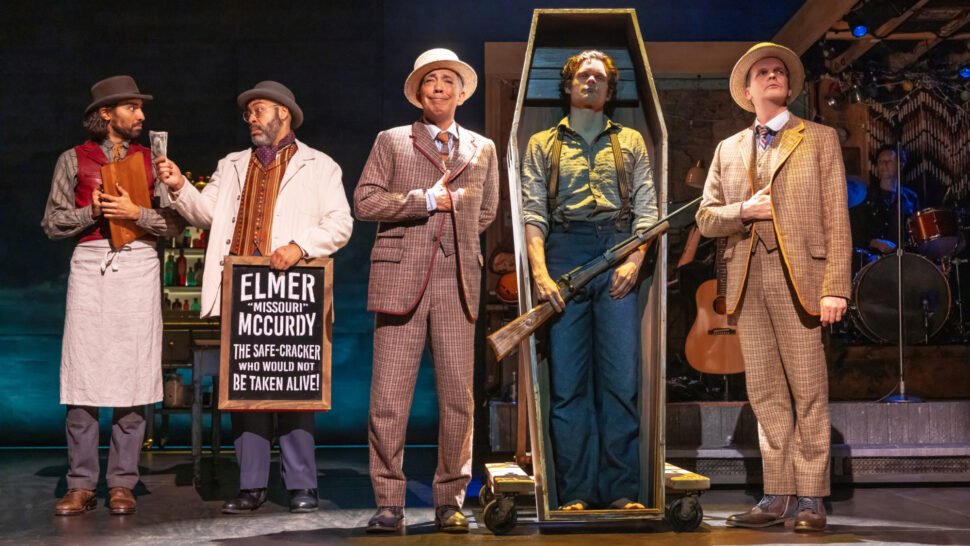What Do Broadway Audiences Want? A Farewell to “Dead Outlaw”
(Photo: Matthew Murphy)
by Chris Peterson
On paper, Dead Outlaw should have been a Broadway hit.
It had an original story, a sharp creative team, and rave reviews. Music by the criminally underrated David Yazbek. A book by Itamar Moses. And directed by one of my faves, David Cromer. If you’re building a musical from scratch, that’s a dream team. Add in a true story about an outlaw whose mummified body became a sideshow attraction after his death, and you’ve got something bold, bizarre, and completely unlike anything else on Broadway.
And yet, the show will close on June 29 at the Longacre Theatre, after just 73 regular performances.
It’s a tough goodbye. Dead Outlaw didn’t crash and burn. It didn’t miss the mark. In fact, it checked every single box people claim to want: original, daring, intelligent, fresh, and well-reviewed. It won a slew of awards for its off-Broadway run and earned seven Tony nominations this year. Critics loved it. The cast album is a knockout. But somehow, that wasn’t enough.
So here we are, watching another strong show fade out way too early—and asking, once again, what does Broadway really want?
Because if a show like Dead Outlaw can’t make it, we need to stop pretending Broadway is a place that rewards originality. Not unless it comes with a celebrity, a famous brand name, or a guaranteed audience built in. This season was packed with revivals, sequels, adaptations, and legacy titles. In that kind of landscape, Dead Outlaw was fighting for air from the beginning.
Producers Lia Vollack and Sonia Friedman put it plainly: “The commercial momentum just wasn’t fast enough in a crowded season.” They’re not wrong. The show didn’t win any Tonys. It didn’t have a movie tie-in or a major star. It wasn’t based on a book everyone read in high school. What it had was story, craft, and heart—and right now, that’s not always enough.
This isn’t just about one show closing. It’s about a pattern. Risky(Redwood), thoughtful(Suffs), original (Swept Away) shows are getting squeezed out. Meanwhile, ticket prices keep rising, and audiences keep choosing familiarity over discovery. Who can blame them? If you’re spending $150 on a night out, are you going to gamble on something new, or see the thing you already know you’ll like?
It’s not just economics. It’s psychology. People are tired, overworked, and cautious. But if we keep saying no to shows like Dead Outlaw, we’re going to wake up one day with nothing left but jukeboxes and reboots.
Online, fans are already mourning. “Dropping like flies,” one person wrote. Another pleaded, “If you haven’t seen it, go before it’s gone.” But by now, it’s too late. The final week is here. The seats are suddenly full. That always happens. The urgency kicks in once the show is already slipping away.
There is a small silver lining. The cast recording is out now, and a full audio play will release on Audible this fall. Like the outlaw at the center of the story, Dead Outlaw may have a strange and winding afterlife. But Broadway is where it belonged, and it didn’t get the time it deserved.
It’s frustrating because this show did everything right. It was smart. It was different. It didn’t play it safe. And it still couldn’t survive.
So again—what does Broadway really want?
If the answer is “more of the same,” we’re going to keep losing shows like this. If the answer is “something new,” then we all—audiences, producers, critics, and institutions—have to start acting like it. That means buying tickets, yes, but it also means giving shows time to grow. It means lifting up the ones that take a risk. It means paying attention.
Because we can’t say we want fresh voices and then ignore them when they show up. Broadway doesn’t just need new stories. It needs people willing to listen.
